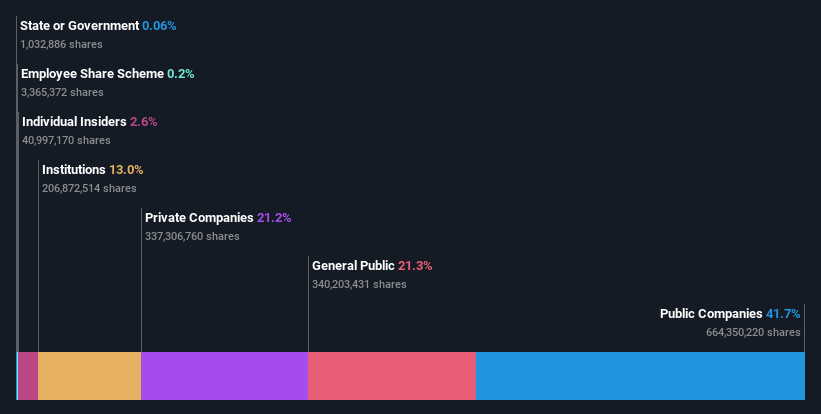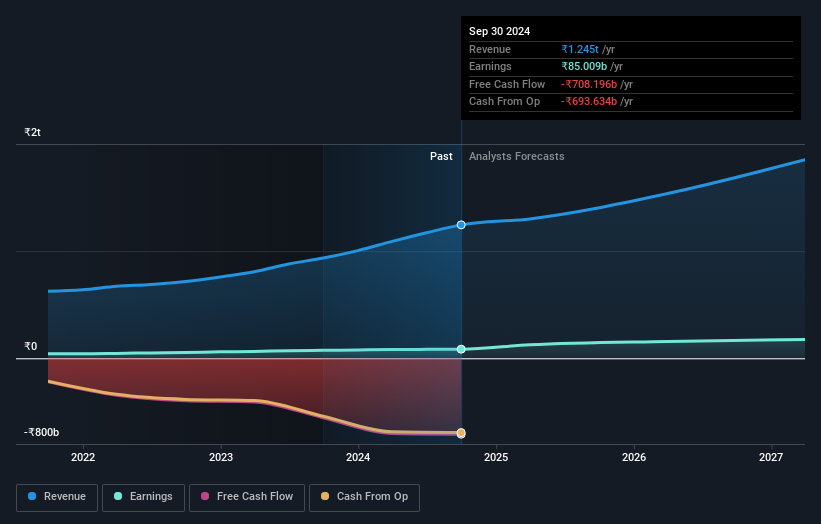- India
- /
- Diversified Financial
- /
- NSEI:BAJAJFINSV
Bajaj Finserv Ltd. (NSE:BAJAJFINSV) stock most popular amongst public companies who own 42%, while individual investors hold 21%
Key Insights
- Significant control over Bajaj Finserv by public companies implies that the general public has more power to influence management and governance-related decisions
- The top 2 shareholders own 54% of the company
- Insiders have sold recently
To get a sense of who is truly in control of Bajaj Finserv Ltd. (NSE:BAJAJFINSV), it is important to understand the ownership structure of the business. And the group that holds the biggest piece of the pie are public companies with 42% ownership. Put another way, the group faces the maximum upside potential (or downside risk).
Meanwhile, individual investors make up 21% of the company’s shareholders.
In the chart below, we zoom in on the different ownership groups of Bajaj Finserv.
View our latest analysis for Bajaj Finserv

What Does The Institutional Ownership Tell Us About Bajaj Finserv?
Institutional investors commonly compare their own returns to the returns of a commonly followed index. So they generally do consider buying larger companies that are included in the relevant benchmark index.
Bajaj Finserv already has institutions on the share registry. Indeed, they own a respectable stake in the company. This can indicate that the company has a certain degree of credibility in the investment community. However, it is best to be wary of relying on the supposed validation that comes with institutional investors. They too, get it wrong sometimes. It is not uncommon to see a big share price drop if two large institutional investors try to sell out of a stock at the same time. So it is worth checking the past earnings trajectory of Bajaj Finserv, (below). Of course, keep in mind that there are other factors to consider, too.

We note that hedge funds don't have a meaningful investment in Bajaj Finserv. The company's largest shareholder is Bajaj Holdings & Investment Limited, with ownership of 42%. Meanwhile, the second and third largest shareholders, hold 13% and 3.9%, of the shares outstanding, respectively.
After doing some more digging, we found that the top 2 shareholders collectively control more than half of the company's shares, implying that they have considerable power to influence the company's decisions.
While studying institutional ownership for a company can add value to your research, it is also a good practice to research analyst recommendations to get a deeper understand of a stock's expected performance. Quite a few analysts cover the stock, so you could look into forecast growth quite easily.
Insider Ownership Of Bajaj Finserv
The definition of company insiders can be subjective and does vary between jurisdictions. Our data reflects individual insiders, capturing board members at the very least. Company management run the business, but the CEO will answer to the board, even if he or she is a member of it.
Most consider insider ownership a positive because it can indicate the board is well aligned with other shareholders. However, on some occasions too much power is concentrated within this group.
We can see that insiders own shares in Bajaj Finserv Ltd.. It is a very large company, and board members collectively own ₹69b worth of shares (at current prices). we sometimes take an interest in whether they have been buying or selling.
General Public Ownership
The general public-- including retail investors -- own 21% stake in the company, and hence can't easily be ignored. While this group can't necessarily call the shots, it can certainly have a real influence on how the company is run.
Private Company Ownership
We can see that Private Companies own 21%, of the shares on issue. Private companies may be related parties. Sometimes insiders have an interest in a public company through a holding in a private company, rather than in their own capacity as an individual. While it's hard to draw any broad stroke conclusions, it is worth noting as an area for further research.
Public Company Ownership
Public companies currently own 42% of Bajaj Finserv stock. We can't be certain but it is quite possible this is a strategic stake. The businesses may be similar, or work together.
Next Steps:
I find it very interesting to look at who exactly owns a company. But to truly gain insight, we need to consider other information, too. Case in point: We've spotted 3 warning signs for Bajaj Finserv you should be aware of, and 2 of them make us uncomfortable.
But ultimately it is the future, not the past, that will determine how well the owners of this business will do. Therefore we think it advisable to take a look at this free report showing whether analysts are predicting a brighter future.
NB: Figures in this article are calculated using data from the last twelve months, which refer to the 12-month period ending on the last date of the month the financial statement is dated. This may not be consistent with full year annual report figures.
Valuation is complex, but we're here to simplify it.
Discover if Bajaj Finserv might be undervalued or overvalued with our detailed analysis, featuring fair value estimates, potential risks, dividends, insider trades, and its financial condition.
Access Free AnalysisHave feedback on this article? Concerned about the content? Get in touch with us directly. Alternatively, email editorial-team (at) simplywallst.com.
This article by Simply Wall St is general in nature. We provide commentary based on historical data and analyst forecasts only using an unbiased methodology and our articles are not intended to be financial advice. It does not constitute a recommendation to buy or sell any stock, and does not take account of your objectives, or your financial situation. We aim to bring you long-term focused analysis driven by fundamental data. Note that our analysis may not factor in the latest price-sensitive company announcements or qualitative material. Simply Wall St has no position in any stocks mentioned.
About NSEI:BAJAJFINSV
Bajaj Finserv
Through its subsidiaries, provides financial services in India.
Proven track record with moderate growth potential.
Market Insights
Community Narratives




